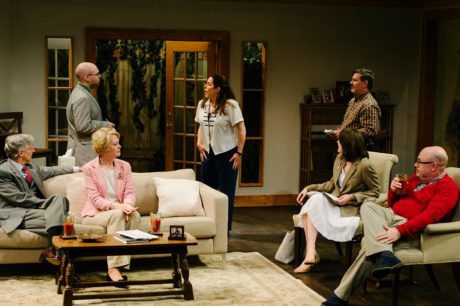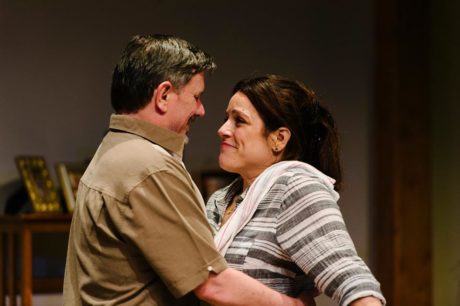Lyssa is sitting in her living room with her father, Senator Alan Hughes. He reads to her a letter from their ancestor, General Ulysses S. Grant, to his own daughter Ellen Wrenshell. In the midst of the American Civil War, Ulysses writes home to try and convince his daughter not to drop out of the play at the local town fair. He confesses that there are days he too wishes not to continue in his own battles, but explains: “It seems to me, for both of us, our task is to rise and continue.”

The line, “our task is to rise and continue” repeats twice in An American Daughter, and looking back, almost acts as an anthem for the play. The story demonstrates the importance of fighting for one’s own values, even if all of the surrounding circumstances are arguing against. When things get tough, we keep going – we “rise and continue.”
Written by Wendy Wasserstein and directed by Brandon McCoy, An American Daughter follows Dr. Lyssa Dent Hughes (Susan Marie Rhea) as she enters the world of politics after the president nominates her to be Sergeant General. Though she leads a seemingly ideal life with two kids and a professor for a husband, everyone has their secrets. When one indiscretion from her past rises to the surface, Lyssa must not only decide how to best proceed, but also come to terms with the fact that her skin may just not be tough enough to survive the cut throat world of politics.
Fast-paced and witty, Wasserstein’s script cleverly draws a connection between the personal and the political, and asks the questions: What do you regret in life? If you could go back, would you act differently? And if your life suddenly became a public performance for everyone to see, would remain true to yourself? Or would you play the game and change to win?
In order to raise these topics, Wasserstein created caricatures of figures we see in modern-day politics. We had the hard-core feminist in Quincy Quince (Brianna Letourneau), who found a connection between an everyday conflict and an argument on sexism in society. There was Senator Alan Hughes (Timothy H. Lynch), who portrayed the politician with a public façade, never quite speaking his mind and always seemingly has an alternative agenda, and even Charlotte Hughes (Sheri S. Herren), the blonde trophy wife. The story walked the line between immensely comedic and dramatic, and was perfectly appropriate given the current election.

Led by McCoy, the artistic team successfully brought the theme of “personal versus political” to life, starting with Matthew J. Keenan’s set design. The living room of the Hughes family home took up the stage, and was full of impressive detail – down to the two sets of throw pillows on the couch (one for company, and one for the family). Keenan included hallways and a staircase that extended off stage, giving us the illusion that the house continued far past the limits of the theatre. The design was lovely, and also played to an important instruction from the playwright.
Wasserstein calls for all of the action to take place within the living room, including a number of interviews involving Lyssa. Timber Tucker (Michael Innocenti) conducts a couple interviews and explorations of the home, and Quincy Quince intrudes upon the home with little warning throughout the play with the hopes of getting an exclusive with Lyssa or her husband. Even just outside the “house,” we hear references to the vans of press waiting for Lyssa to make a move. The choice to keep everything within the home emphasizes this concept of “the personal versus the political,” and how even within the safety of her home, Lyssa must put on the right performance to impress.
Sound Designer Tony Angelini enhanced that concept even further through the combination of Beach Boys music and interview coverage. It is established early on that Lyssa’s husband, Dr. Walter Abrahamson (Mark A. Rhea) is a Beach Boys fan, and he would often play the music in the living room, which eventually became a soundtrack for his marriage to Lyssa. The two of them would quote the songs and share small, beautiful moments with them; however, when their marriage starts to reach conflict and difficulty, the music becomes a painful reminder of what they once had. In combining this music with the excerpts of interviews during scene transitions, Angelini emphasizes the impacts of politics on Lyssa’s personal affairs, and how her choices in that public sphere can have a harmful impact on that which she holds dear.
The world of politics is fast-paced, and Wasserstein brings this characteristic to her script. McCoy clearly worked with his actors a great deal on that aspect, because they brought that element to life. The pacing was spot-on, and helped the witty jokes land, resulting in uproars of laughter from the audience. Each of the actors in this ensemble played off each other wonderfully, and successfully carried me from moment to moment, always wanting to see more.
Herren brought the humor through her portrayal of Charlotte (Chubby) Hughes. With comments that aired on the offensive and/or ignorant side, she always kept the audience laughing. However, Herren also added a level of depth that was lovely to watch unfold. She added a sense of genuineness that was lacking in so many of the other characters, and created a nice contrast, especially to a character like Quincy Quince.
Letourneau brought great comedic timing and stage presence to the role, and also a level of complexity. While it was easy to dislike Quincy Quince with her single-minded character that views the world and feminism in a “black and white” format, Letourneau also emphasized that which was underneath – a need to see the world improve for women. The character was driven, and though I found myself shocked at some of her actions, I also realized I felt sympathy.
Lolita Marie’s Dr. Judith B. Kaufman was a riot from her first entrance, with her frank honesty and dark sarcasm. I loved her friendship with Lyssa, and Marie and Rhea showcased a beautiful stage chemistry that made me believe they were best friends for years. Friendship is about the highs and lows, and the two actors brought that to life in these characters, especially when Lyssa’s career began to go south.

Finally, Susan Marie Rhea and Mark A. Rhea created a fantastic relationship in Lyssa and Walter. Though I am sure it helps that the actors themselves are married, that chemistry helped the two create some beautiful moments on stage. Lyssa and Walter dance to a Beach Boys song, and the sweetness of the moment set up the idea that all would go well for the two of them (or so we think). The love they shared felt real, and I wanted to see them succeed through what was to come.
Witty and fun, Keegan Theatre’s An American Daughter is a show you do not want to miss. With the elections surrounding us, this is a production that is so relevant.
Running Time: Two and a half hours, with a 15-minute intermission.
An American Daughter plays through May 28, 2016 at The Keegan Theatre – 1742 Church Street NW, in Washington, DC. For tickets, call the box office at (202) 265-3767, or purchase them online.
LINK:
Review #1: ‘An American Daughter’ at The Keegan Theatre by John Stoltenberg
RATING:




